Kirk's Connection
Interpersonal & Interdisciplinary Relationships Help Infant Recover From Near Drowning Brain Injury
First-birthday memories are usually filled with family, friends, balloons and big pieces of cake. That was not the case for Kirk and his family. Instead, there were chest compressions, mouth-to-mouth resuscitation and a frantic drive to the emergency room.
In August 2020, the joy-filled, healthy little boy was found unresponsive and without a pulse in a pond at his first birthday party.
“His dad saw him face up and we threw him in the car. I drove and dad performed CPR,” said Catherine Herrmann, Kirk’s mom. “He ended up being flown to Westchester Medical Center and was in the ICU for two weeks.”
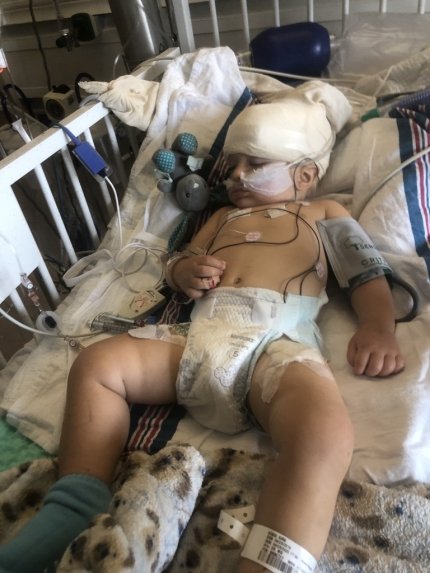
The rapid response of Kirk’s parents and medical professionals saved his life after a cardiac arrest from near drowning. But, he had sustained an anoxic brain injury. The lack of oxygen to Kirk’s brain resulted in seizures, neurological deficits, difficulty swallowing that necessitated a feeding tube, and painful involuntary muscle spasms.
“It put him in a perpetual spasm. Every five minutes he would do this arch-tensing pattern, which was very stressful. He wasn’t sleeping at all,” said Herrmann.
After less than a month, Kirk was transferred to Blythedale Children’s Hospital. He was admitted as an inpatient to the Brain Injury Unit, the only dedicated post-acute Pediatric Brain Injury Unit in New York, for intensive rehabilitation and medical management of his complicated condition. In addition to treating children and adolescents recovering from near drownings, the Unit also specializes in Traumatic Brain Injury (TBI), post-infectious diseases such as meningitis and Anti-NMDA receptor encephalitis (ANMDAR), brain tumors and stroke.
It's the kind of place that many people don’t know about until something happens to your child and then, we’re there for you,”
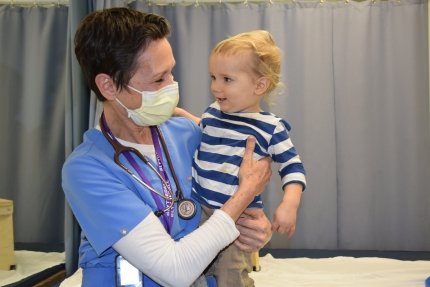
said Dr. Kathy Silverman, D.O., Unit Chief, Pediatric, Adolescent and TBI Units at Blythedale Children’s Hospital. “We have a great team of well-trained individuals that have worked for extensively with brain-injured patients. Together, we helped get Kirk stable so he could begin work with our excellent therapists.”
As Blythedale’s interdisciplinary team eased Kirk’s spasms and found a medical equilibrium for him, the youngster was able to rest, begin healing and reconnect with the world.
“They were very encouraging of us all working together to give Kirk the most support possible,” said his mom.
I was considered an integral part of his recovery which felt very empowering.”
Kirk slowly began to show improvements. The smiling, laughing and playfulness he was known for, was returning.
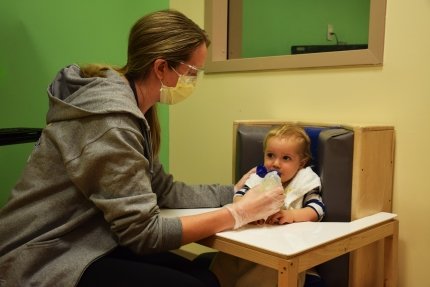
“He can sit and play, roll around, creep on his hands and knees, pull himself up into standing and even take a few steps with my help,” said Karen Conti, senior physical therapist at Blythedale. “Kirk is just so eager to play that it makes me feel good to see him relaxed and happy. Our goal is to get him back to his previous level of function.”
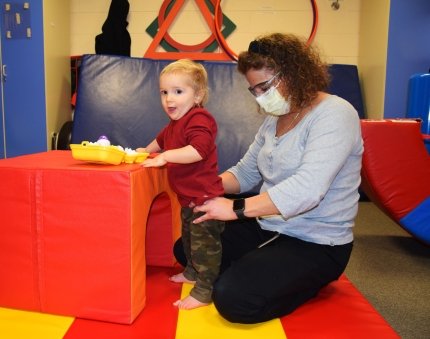
In occupational therapy sessions, Kirk increased his sensory and motor responses through exploring, reaching and grasping for toys while relearning how to connect with his environment in a meaningful way.
Speech and feeding therapy sessions had similar successes for Kirk. Shortly after his initial admission to Blythedale, Kirk had a gastronomy tube inserted to help with feedings and medicine. Three months later, the infant was able to taste food by mouth while vocalizing and babbling to make pre-linguistic sounds.
Just before New Year’s Eve, Kirk was discharged as an inpatient from Blythedale. He was taking almost all of his nutrition by mouth and his parents had successfully completed the Hospital’s parent/caregiver training on how to care for their medically complex child.
My family and I are extremely grateful for all the hope and support Blythedale gave us,”
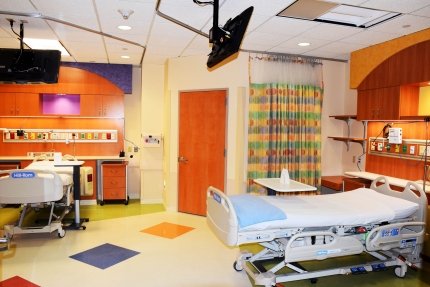
said Hermann. “Whether emotional or physical support - there was never a limit put on it.”
Days after ringing in 2021 at home with his family, Kirk was back at Blythedale as an outpatient to build upon the gains he made, but this time, he wasn’t the only one that underwent a major improvement.
Blythedale’s Brain Injury Unit, Kirk’s home away from home during recovery, had been part of the Hospital’s new $27M construction project. Eight beds were added to increase capacity and provide much-needed services to more patients in a timely fashion.
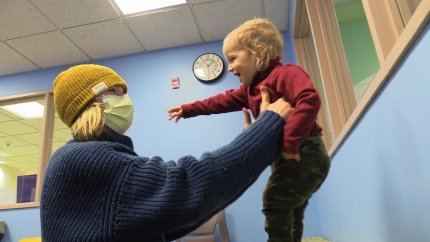
“When you work with patients like Kirk and see the progress that the kids like him on the Brain Injury Unit make, it’s like getting to see a miracle,” said Dr. Silverman. “Blythedale is best known for being able to take care of children with severe medical complexity and intense rehabilitation needs. It is one of the few places in this country that can provide both.”



